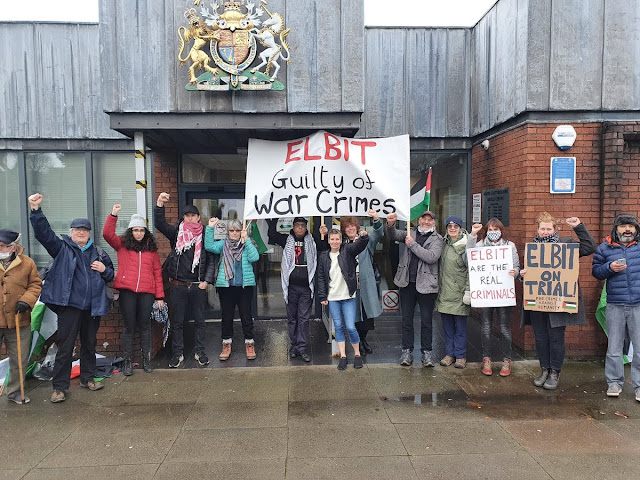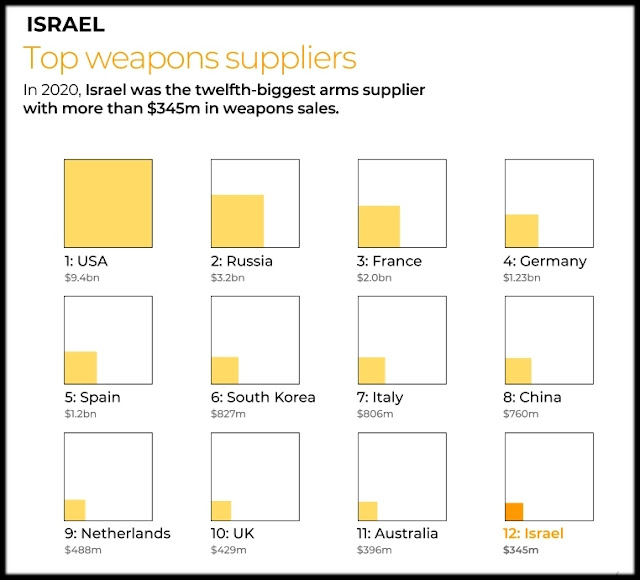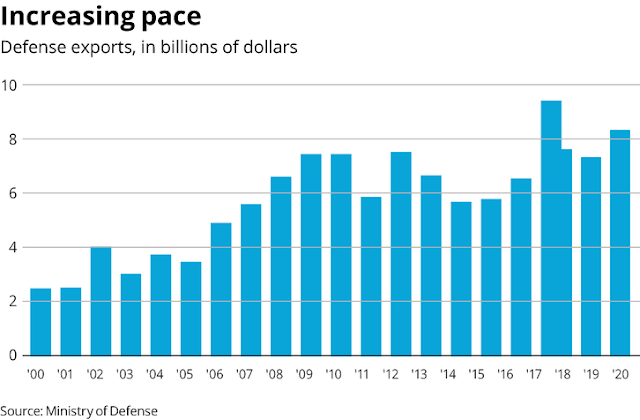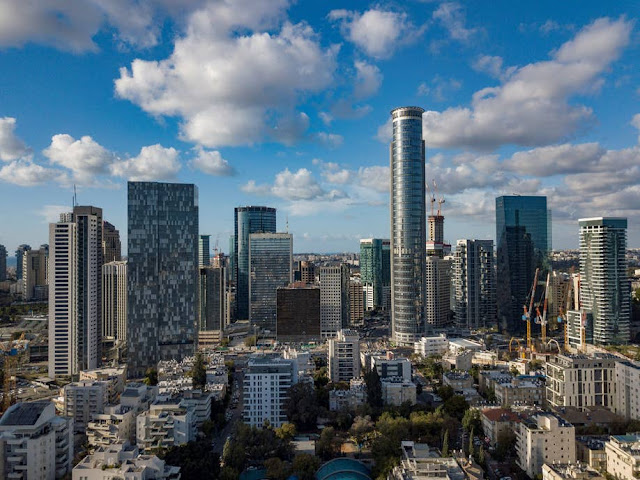Israel exports arms that endanger human rights because it serves us, top defense official admits
Last week
the first trial of Palestine Action activists trying to close down Elbit
arms factories in Britain ended with the acquittal of all 3 activists. This is
the first of a series of such trials. Unlike the defendants at Newcastle, those
on trial will be able to appeal to juries and argue that the very existence of
such companies, dedicated as they are to the murder and maiming of civilians,
is contrary to both British and International Law. Below is a summary of the
main points of law that led to the acquittals by John Nicholson, a former
barrister and himself a Palestine solidarity activist.
In January three activists threw bottles of red paint and locked
themselves across the entrance gates, closing down UAV Systems in Shenstone as
part of Palestine Action’s campaign against Elbit Systems. UAV is a subsidiary of
Elbit which manufactures drones used against Palestinians in the occupied
territories.
Eleven months later, they appeared at Newcastle-Under-Lyme
magistrates court accused of committing criminal damage. On Monday, at the end
of a two-day trial, Judge Waites found them not guilty.
For nearly 18 months there have been a series of sustained protests at many of Elbit’s offices and factories around the country which police claim have caused a total of around £15
million of damage. While activists gave evidence in open court the Elbit
witness gave their evidence hidden behind a screen.
The Judge ruled that the Crown Prosecution Service had not
proved that convicting the defendants would be proportionate to their right to
protest, adding that Palestine and the arms trade were important issues and the
activists had specifically targeted the drone manufacturer in accordance with
their strongly-held beliefs.
UK police have offered 24 hour rapid-response at Elbit sites and
have regularly raided and arrested activists in an attempt to disrupt the
campaign. See UK's
Palestine Action wins Israel protest court battle. This contrasts with their virtual decriminalisation of rape as they plead 'lack of resources'.
Legal Summary
The judge found that:
1.
This was an important issue. Palestine and the arms trade were serious concerns. In Ziegler the Supreme
Court said that the court cannot judge on the merit of the protest, but the
right to protest is important and this particular protest was on serious and
important issues.
2.
The defendants believed in what
they were doing. Defendants’ views came across
clearly (time in Palestine, campaigning and friendship with a Palestinian
family [most of whom had been killed by a drone attack]) and they were serious
people who were strongly motivated.
3.
The location was deliberately
chosen – UAV Engines. There were a
number of aims, educating, stopping production, symbolic blood, all linked to
the location.
4. The duration was limited. 7 hours (4.30-11.30 am). One gate. The second part of the protest was not said to be criminal, the CPS only charged on criminal damage, throwing the red paint and although it was not just the time taken to throw the paint (a few minutes) but the time to clear it up, the fact that Elbit took two days and charged £900 was not realistic. It was just that they hadn’t got round to it – really it was an hour or so as only 5-6 car parking spaces were affected.
5.
The disruption was limited. And there was no evidence the paint/bottles went near the dog handler
or his dog. He gave evidence that he felt “not
happy” but made it clear that there was no violence. There was no especial
trauma caused to him. The CPS mentioned private houses opposite – but there was
no evidence that anyone was upset. They might have been out or even
sympathetic. The nature of the area was otherwise commercial. Extent of
obstruction was broken glass, limited to a few bottles, not all were broken,
and one of the defendants graphically described how it was swept up! No
obstruction to members of the public.
6.
No danger to public order. It could have been different if it had been during
the day.
The judge then summarised – important issues, limited duration, focused
on objectives, limited impact on workers or public, no significant danger. They
did however commit a criminal offence. But... the legal authorities make clear
that judgment requires more than just consideration of blocking the highways
(Ziegler). There is also Articles 10 and 11 of the European Convention on Human
Rights (ECHR) and that this could include cases involving criminal damage (one
such included red paint on a statue). The degree of damage is part of the
balancing act – at one end cutting off a petal, at the other bulldozing a
building. This was in between. Symbolic use of paint (not disputed it was water
based and washed off easily – if it had been done more quickly by Elbit that
is). It was at the upper end of the scale of proportionality and the judge was
therefore not sure that the interference (by the CPS) with the right to protest
was justified. Not guilty!!
The Judge emphasised that there are consequences to this. It is not a
precedent (i.e. don’t do it again and expect to get away with it and don’t
expect other cases to be able to say “we won here so we can win again”). Every
case depends on the individual facts.
This was a legal judgment based on Ziegler, the Supreme Court case
(which is binding on all courts). Ziegler is about proportionality, which the
court agreed is not limited to blocking the roads. This was much more likely to
succeed than other defences (which were also put), such as necessity, because the
action taken here may not so easily be linked to the desired outcome there,
that is, it may not be effective enough to stop bombing of Gaza and the link
between the two may be too remote.
The judge was absolutely insistent that this was not a precedent.
Legally that is correct. The barristers made clear that the judge could and
should find in our favour here, irrespective of any other possible future
cases. One of the defendants made it pretty clear that she would be going back
to protest every day she could – and that everyone in the court had a moral
duty to go and do the same! So the judge was trying to say we can’t do that and
expect to get away with it. But – in all human and political terms – this is a
precedent. If we had lost, the CPS would be using it the other way. Maybe (just
maybe) the CPS will have to rethink some of the other charges in the light of
this.
An EXTRA artillery rocket system developed and manufactured by Israel Military Industries.Credit: Elbit
The CPS didn’t charge for anything other than throwing the red paint
(and criminal damage resulting). This meant they artificially separated the
aspects of the action, and the defendants did well to say that all of the bits
of the action were part and parcel of the one action. It did not seem to be
clear to the judge why the CPS didn’t go for other charges, such as
preventing workers going to work or other trade union related “offences”. I
think that all the other PA protesters have had charges dropped when they just
blocked the road or locked on, while this one was “lock-on plus”, ie they threw
red paint (soluble, symbolic, red paint to represent the blood of the
Palestinians killed by Elbit). So the CPS fought this on the “plus”. [Doesn’t
anyone know about the suffragists??]
There is a tension between our arguments – on the one hand the actions
do aim to maximise the stopping of production at Elbit and/or damage; on the
other hand, in court our arguments are that it was limited and didn’t do very
much. No way of getting round this, other than the more “political” defences of
necessity and crime prevention. Elbit’s crime is far worse than ours,
international law is on our side etc.
Support in the court is essential. It hopefully did help the defendants,
to feel they had an audience, and they were very well prepared and “performed”
brilliantly. END
Israel – A Military With A State
In 2020 Israel spent $22bn on its military, $2,508 per capita
and some 12% of total government spending. This is the highest in the world.
Compare this to Israel’s treatment of its holocaust survivors.
When it comes to defending Israeli apartheid Israel’s propagandists never fail
to use the holocaust as a justification for Israel’s crimes. Yet what is the
reality of Israel’s treatment of the survivors?
According to the Times
of Israel over half of Israel’s holocaust survivors require food handouts, ‘with many saying they don’t have the funds
to pay for essentials such as eyeglasses and hearing aids’.
In a poll conducted by the Holocaust Survivors’ Welfare Fund,
51% said they relied on food given to them by various charities, with a third
saying they were in “dire need” of assistance.
According to the poll, many Holocaust survivors say they are forced to give up essentials in order to have enough money for food. Forty-three percent of respondents said they didn’t have enough money for spectacles, 33% said they couldn’t afford dental care and 27% said they couldn’t pay for hearing aids.
The reality is that the holocaust survivors have subsidised
the Israeli state ever since its foundation. The reparations that Germany paid
to Israel did not go to the survivors but to the Israeli state and the Jewish Claims
Conference, where much of it was embezzled away.
But if Israel is generous to its military and arms industry
it is parsimonious to those who survived the holocaust. Below is a graph of Israeli
spending compared to other countries.
Israel is a key global supplier of advanced weaponry, including drones, missiles, radar technology and other systems. In 2020, it was the 12th-biggest arms supplier with more than $345m in weapons sales to 16 countries, according to the SIPRI database.
See Infographic: What you need to know about Israel’s military
Israel
exports arms that endanger human rights because it serves us, top defense
official admits
Top defense
official at the event: 'We should have
defended NSO rather than caving to the Americans'
Avi Bar-Eli Dec. 7, 2021 11:46 AM
It’s been nearly five months since
the last scandal involving the cyber offense firm NSO Group. In the time since,
it has become abundantly clear that it was one scandal too many.
An international inquiry has produced
a long list of journalists, social activists and politicians, including VIPs,
all of whom were ostensibly targeted by NSO’s Pegasus software.
At the top of the list is French President Emmanuel Macron.
'If we did not collaborate with this or the other
dictatorial regime we would not have the defense that we do have'
The list also sheds light on the
states that are evidently in possession of Pegasus, and its suspicious
correspondence with the states that Israel’s government has identified as
geopolitical targets. From there, it’s a short road to the assertion that not
only does NSO have a light trigger finger when it comes to providing services
to controversial regimes around the world, but that Pegasus virtually serves as
a down payment on the establishment of unofficial diplomatic relations between
these countries and Israel. These revelations led to a procession of apologies
and clarifications from high-ranking Israelis.
These efforts did nothing to keep the
United States from placing NSO on a blacklist –
a death blow to the company. Moreover, on Saturday Reuters published a report
claiming that the mobile devices of at least nine U.S. State Department serving
in Africa were hacked using Pegasus, driving a final nail into the company’s
coffin.
Eli Pinko, the first director of the Defense Export Control Agency.Credit: Linkedin
Throughout this entire period, official Israeli sources have failed to
offer any response to the NSO affair, even when the debate focused on
theoretical issues, such as the role of Israeli defense exports in a changing world.
Given all this, interest ran high when Eli Pinko – who had been the first
director of the Defense Export Control Agency, appointed in 2006 – addressed a
closed conference at a Ramat Gan law firm last week dealing with Israeli defense exports. According to
materials obtained by The Marker, Pinko didn’t disappoint the attendees, who
were drawn from the ranks of the defense export industry.
“The Defense Ministry should have
come out in defense of NSO,” Pinko said, “rather than caving
to the Americans and the French and sending [Defense Minister Benny Gantz to
France] to explain what did and didn’t happen.” As such, Pinko was
expressing the prevailing mood in the ministry, even though he is no longer a
civil servant.
“Did NSO receive a license? Were they working in accordance with that
license? If so, then defend them!” Pinko admonished the audience.
‘Those
arrogant Israelis’
Behind closed doors, NSO is claiming that their sales received government
approval. The company has appealed to the Foreign Ministry and the Prime
Minister’s Office with a plea for help. At the gathering in Ramat Gan, the
company’s narrative was practically taken for granted.
“This whole ordeal is a match-up
between the U.S. National Security Agency and NSO,” one participant said,
insinuating that NSO had “stepped on the
toes” of the NSA. “Those arrogant
Israelis eliminated the technological edge that the Americans had been building
up over 20 years, ever since 9/11 – and began selling this know-how to every
good-for-nothing leader in Africa,” he explained. “I’m convinced that NSO has no idea why they ended up on the list over
anyone else,” another participant said.
The gathering was held at the offices of the Meitar law firm. Along with
the Association of Corporate Counsel, the meeting was chaired by Yuval Sasson,
a partner at Meitar and one of the most senior attorneys in the world of
defense exports. The audience included the legal counsels of Israeli defense
contractors. Through his questions, Sasson adeptly zeroed in on the state of
distress his colleagues find themselves in.
“Everyone in this room has fielded
a request of some sort from a state agency, or someone serving a state agency.
Doesn’t that imply some obligation toward us?” Sasson wondered aloud.
“If a company that has aided a state agency, as a
result of that action, finds itself on the American watch list – or is hit with
a civil suit in Europe – isn’t the State of Israel obligated to stand by its
side, to protect it, to handle the situation?”
“In Turkey, for example, Israel
defended the interests of two large Israeli companies,” Pinko recalled (possibly referring
to the canceled export permits of Elbit and Israel Aerospace Industries in
2011, which caused the loss of contracts with the Turkish air force valued at
$140 million).
“What we have here is a matter of
reasonable expectations,” Sasson contended, likening the situation to the
approval of a prospectus by the Israel Securities Authority. “Anyone working in a regulated area, assuming
he abides by the regulations, can reasonably expect that if he suffers damages
as a result of those activities, then the state should enter the fray and not
shirk its responsibility.”
The conference was called “Considerations of Ethics, Morality and Human
Rights in Defense Exports.” An oxymoron, one might say. On the other hand, it
indicates the increasingly critical global discourse regarding defense exports
and the increasing accessibility to no-less-dangerous technological weaponry.
“Are weapons exports ethical at all?
If you’re asking in a utopian world, then the answer is no,” Pinko said. “But we live in a different reality – globally and regionally.”
In his view, the Defense Ministry’s behavior as it pertains to the
protection of human rights – vis-a-vis serving the political interests of
Israel – is “complex,” but with a
clear inference as to which way the balance should skew.
“Human rights [in the target
countries of the exports] are on the agenda – both at the Defense Export
Control Agency and the Foreign Ministry – but rights do not always take top
billing,” he
admitted. “There are state interests that
need to be taken into account, and more than once the decision regarding the
dilemma has been left to the highest political echelons,” said Pinko.
“The defense of the state depends on
many systems. If we did not collaborate with this or the other dictatorial
regime we would not have the defense that we do have,” said Pinko, likely hinting at the
useful relationships that Israel has developed with Iran’s neighbor Saudi
Arabia, the United Arab Emirates and Azerbaijan.
“We are facing a unique situation. Nothing will change that. There is no other possibility. Take this into account: It’s either the civil rights in some country or Israel’s right to exist. I would like to see each of you face this dilemma and say: ‘No, we will champion human rights in the other country.’ Gentlemen, it doesn’t work.”
“If we were Sweden or France, perhaps
we’d be in a different position, but take, for example, the recent incident in
Turkey,” Pinko said,
referring to the arrest of Mordi and Natalie Oknin. “We avoided saying a single word about the involvement of Hamas-Turkey
in the recently exposed terror activities in the territories, even though it
originated from there – until after the couple was released. So to sit here and
spin theories about what should be done and optics – that’s fine, but you
constantly have to see the other side of the coin, as well,” Pink said.
Pinko repeatedly expressed his contentions regarding the world’s double
standard and hypocrisy in its attitude toward Israel.
“I have yet to see publications referencing American attacks in Afghanistan where women and children were killed, nor any reference to massacres committed by French forces in Africa. The world accepts those incidents with equanimity. But when it comes to NSO, which sold a system in accordance with government permits? Suddenly there’s a global outcry. Guys, this is the duplicitous nature of the world.”
“The French company Thales is the
number one exporter of cyber technology in Europe. Who don’t they sell to? Just
name it, they’re already there. Places we wouldn’t dare touch. So they have an
ethical code, or so they say. Very nice,” Pinko said.
“The only
state that upholds the human rights issue is Germany. Germany will not sell to
Saudi Arabia or other such countries, out of considerations of human rights and
the character of the regime in these countries. But still, that didn’t prevent
[German Chancellor Angela] Merkel from offering the Saudis a fleet of
submarines. The fact that they didn’t buy it is a different matter, but the
world is hypocritical.”
Pinko further demonstrated his point, referring to
Microsoft’s withdrawal last March from purchasing the Israeli startup AnyVision
(now called Oosto). AnyVision developed facial-recognition tracking technology.
According to reports in foreign media outlets, Israeli security forces have
made use of this system to surveil Palestinians. “Pressure from the Palestinian lobby on the Democratic Party is what
stopped the sale,” said Pinko. “Microsoft
did not withdraw because it did not want the company. It wanted it. But at the
same time it was under pressure.”
Pinko insinuated that some of the negative publicity surrounding the Israeli industry results from commercial competition in the export markets among three blocs: the United States, Europe and China. As such, he alluded to another role for the Defense Ministry as a sales agent of the local defense industry.
Pinko, it should be noted, bears the scars of the
drones that Israel sold to China in the 1990s, provoking American ire. In
general, regarding recent U.S. pressure on its allies to cut commercial ties
with China, Pinko was critical of the Israeli course of action: “Being in the middle of the West’s demands
and what the Asian bloc is doing is a very difficult task. The regime is
proceeding cautiously, and trying to cover its ass. Nowadays, there’s no
imagination, there’s no long term vision. It’s all short term.”
‘You’re
alone in the fray’
New European Union regulations that took effect in
September require that human rights be considered in all defense export
transactions. Meanwhile, in early November, the United States released a draft
of its own regulations for preliminary public discussion. These included
specific supervision of cyber exports.
The rules of the game are changing, all of the
speakers at the session agreed. Legal threats are not the only new factor under
consideration when export companies make more vigorous efforts to assess
whether a sale is worthwhile.
None other than lawyer Eitay Mack was asked to give
his seal of approval at the gathering. Mack is one of the most prominent
individuals in the human rights niche. In recent years, he has (voluntarily)
taken it upon himself to engage in public supervision of Israel’s defense
exports.
“You’ve been left alone in the fray,”
Mack informed the legal counsels of the defense contractors. “It seems to me, that even though you’re
inundated by the bureaucracy of the defense and foreign ministries, at the end
of the day, they’re incapable of defending you. The Defense Export Control
Agency is not an insurance policy either. Obtaining a permit from them isn’t
like getting approval from the U.S. Food and Drug Administration.”
Mack did not spare his criticism for Israeli
administration officials. The Foreign Ministry, he contended, has been caught
making mistakes more than once and “doesn’t
always know what is going on.” The Defense Ministry consistently foils
parliamentary supervision of defense exports out of its fear of leaks.
The two ministries, Mack contends, oppose amending the
Defense Export Control Law, as it would impose restrictions on the export of
arms – even to countries that are not subject to UN Security Council embargo.
He no longer holds out much hope for the courts either.
Sasson posed a scenario to Mack.
“Let’s say I sold a rifle. I told the customer that he must not enter opposition territory with it. But what can I do? A few months later, you see five soldiers entering a village and massacring people with my rifle. What can I do? Sue my customer? What am I expected to do, aside from not selling to him anymore?”
Mack responded:
“When you’re talking about low-tech,
there isn’t really much you can do. Even when Israel decided to stop exports –
it couldn’t simply round up the weapons. But when it comes to high-tech
technologies, such a possibility must exist. If the exporter has implemented
all means of prevention, kept its finger on the trigger and stopped its use at
the right moment, then, maybe, it has fulfilled its legal obligation.”
Mack concluded.
Another speaker at the gathering was Matan Gutman,
founder of CybeRighTech, and the advisor to former state comptroller Joseph
Shapira. “Each company should look at
itself first of all, at its own obligation to loyalty. And at the minimum
requirements that it must comply with in order to prepare for a moment of
crisis,” he said.
“Even if
the company is scrupulous about preliminary actions that will respond [in the
event of an entanglement] – that may not be enough, because the world is moving
ahead too quickly,” said Gutman.
Pinko concluded the technical discussion of the issue
of arms exports – we are, after all, speaking of a professional gathering –
with a tip for the defense contractors: “I am familiar with the license granted
by the Defense Ministry. If any change needs to be made – it is in the clauses
of this license. It is by means of these clauses that the ministry frees itself
from all responsibility for the licensing process.”
- Arming dictators, equipping pariahs:
Alarming picture of Israel's arms sales
- Targeting
U.S. officials could mean death sentence for Israeli NSO
- Israel issues stricter, but still vague, guidelines for cybertech exports after NSO scandal

















No comments:
Post a Comment
Please submit your comments below